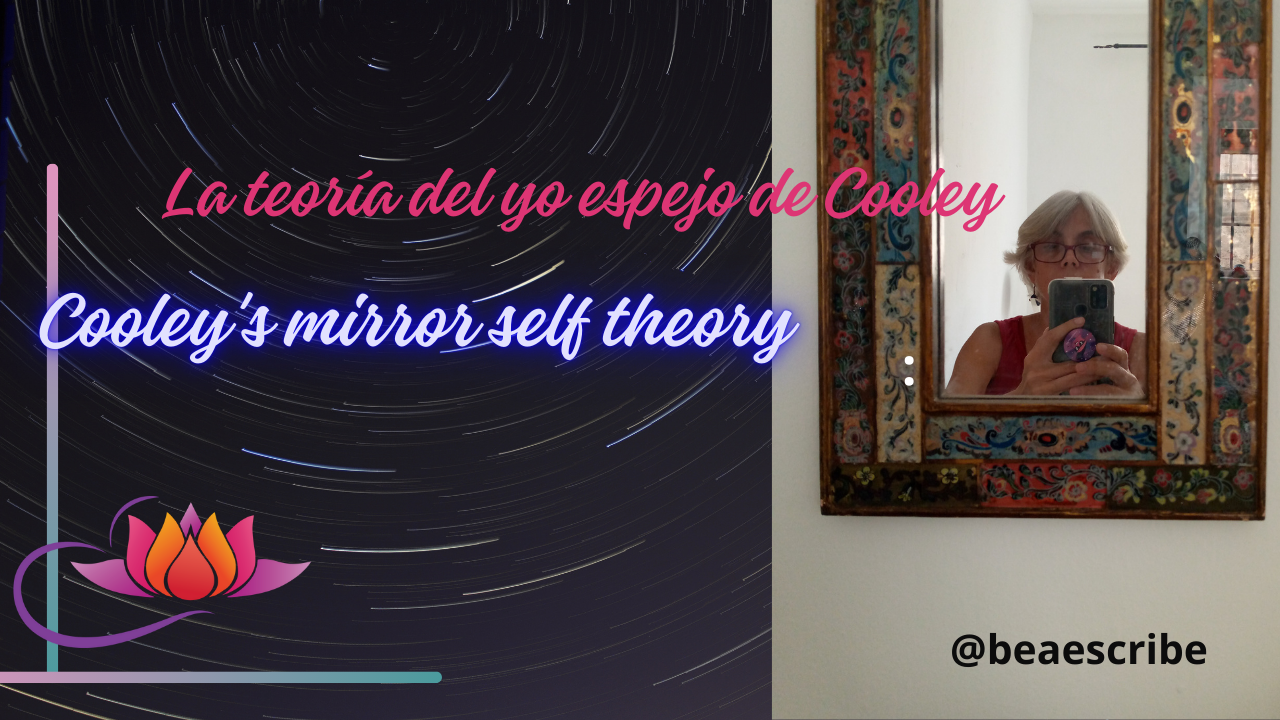
Banner diseñado por mí en canva.com La imagen fue tomada con la cámara de mi teléfono móvil
Banner designed by me on canva.com Photo was taken with my cell phone camera
DIME EN QUIÉN TE MIRAS Y TE DIRÉ QUIEN ERES

Aristóteles dijo hace ya más de dos mil años, en la época clásica de la cultura griega, que el hombre es un “Zoon Politikon”, es decir, un ser social. Efectivamente, aún si vivimos en una pequeña aldea, nos comunicamos y construímos nuestra identidad alimentados por nuestras relaciones con quienes nos rodean. Primero nuestra familia, y luego los demás, son una suerte de espejo. Porque la palabra identidad, ese ser huidizo y cambiante que llamamos “yo”, se construye, y a veces se deconstruye, en tanto se parece a otros, pero así también, en tanto se diferencia de otros.
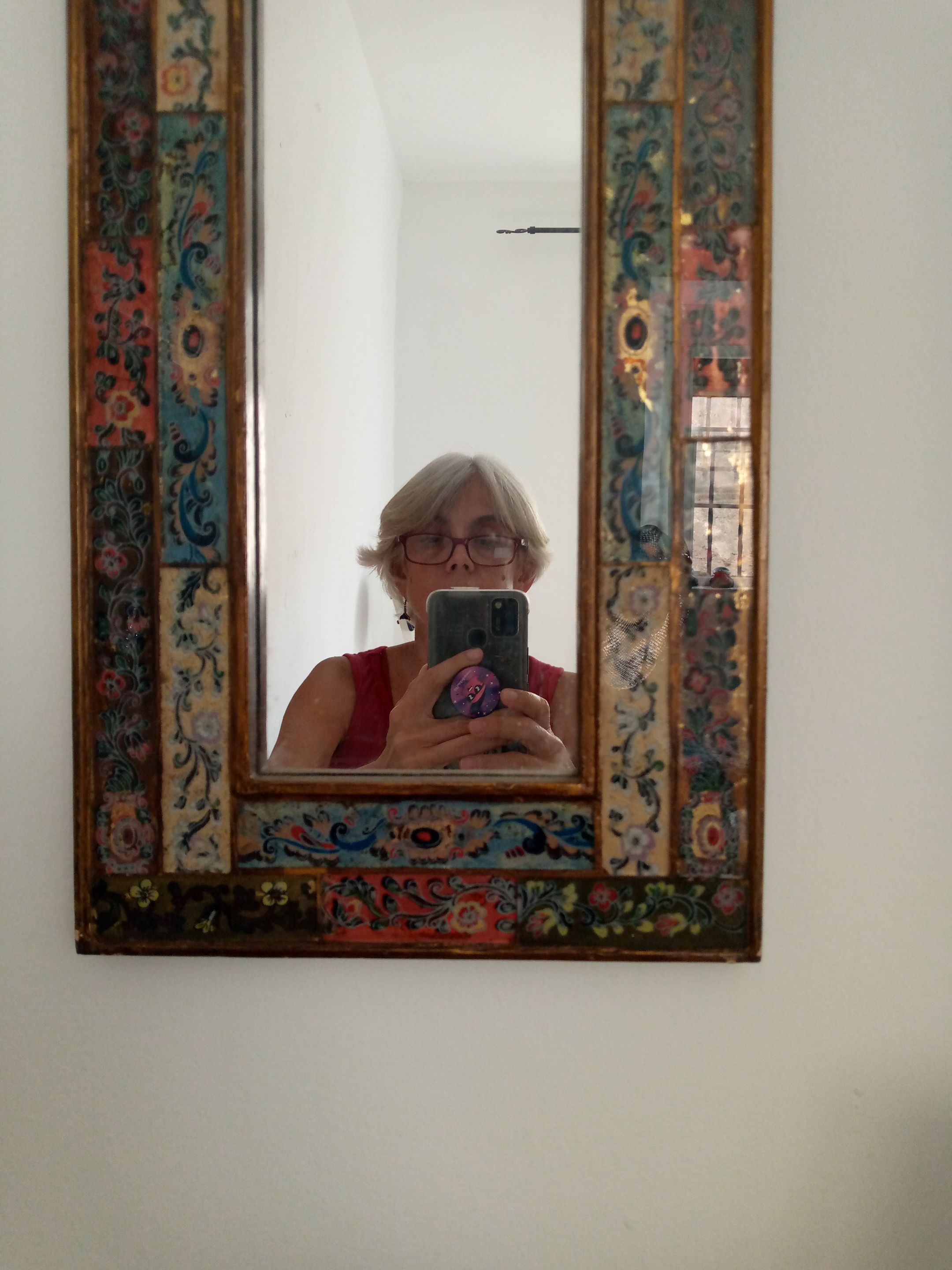

Buscando un tema interesante sobre el cual escribir me encontré con una de esas reflexiones interesantes del doctor @emiliorios , quien retoma en su entrada una reflexión anterior, ambas muy interesantes, que hacen referencia al problema de la identidad y cómo quienes nos rodean influyen en la manera en que nos vemos. Retomaré la más reciente “La opinión de los otros, la mía y la Teoría del Yo espejo de Cooley” https://peakd.com/hive-131951/@emiliorios/la-opinion-de-los-otros-la-mia-y-la-teoria-del-yo-espejo-de-cooley-resultados-de-una-no-iniciativa-7mo-dia-esen Es un excelente tema ahora que estoy en un país nuevo, en una sociedad distinta y procuro adaptarme buscando puntos en común y tratando de obviar lo que me diferencia, lo que me señala como extranjera. Soy venezolana, latinoamericana, y felizmente, vivo ahora en España, un país de habla castellana, vivir en un país en el que se habla otro idioma podría complicar aún más las cosas.
Tomaré algunas frases del doctor Ríos y reflexionaré sobre ellas:
“No podemos negar que estamos viviendo en una cultura en la que es demasiado importante lo que otros piensen de nosotros mismos, la forma como nos ven los demás y de tomar lo que opinamos o creemos sobre algo.”
Las redes sociales como espejo
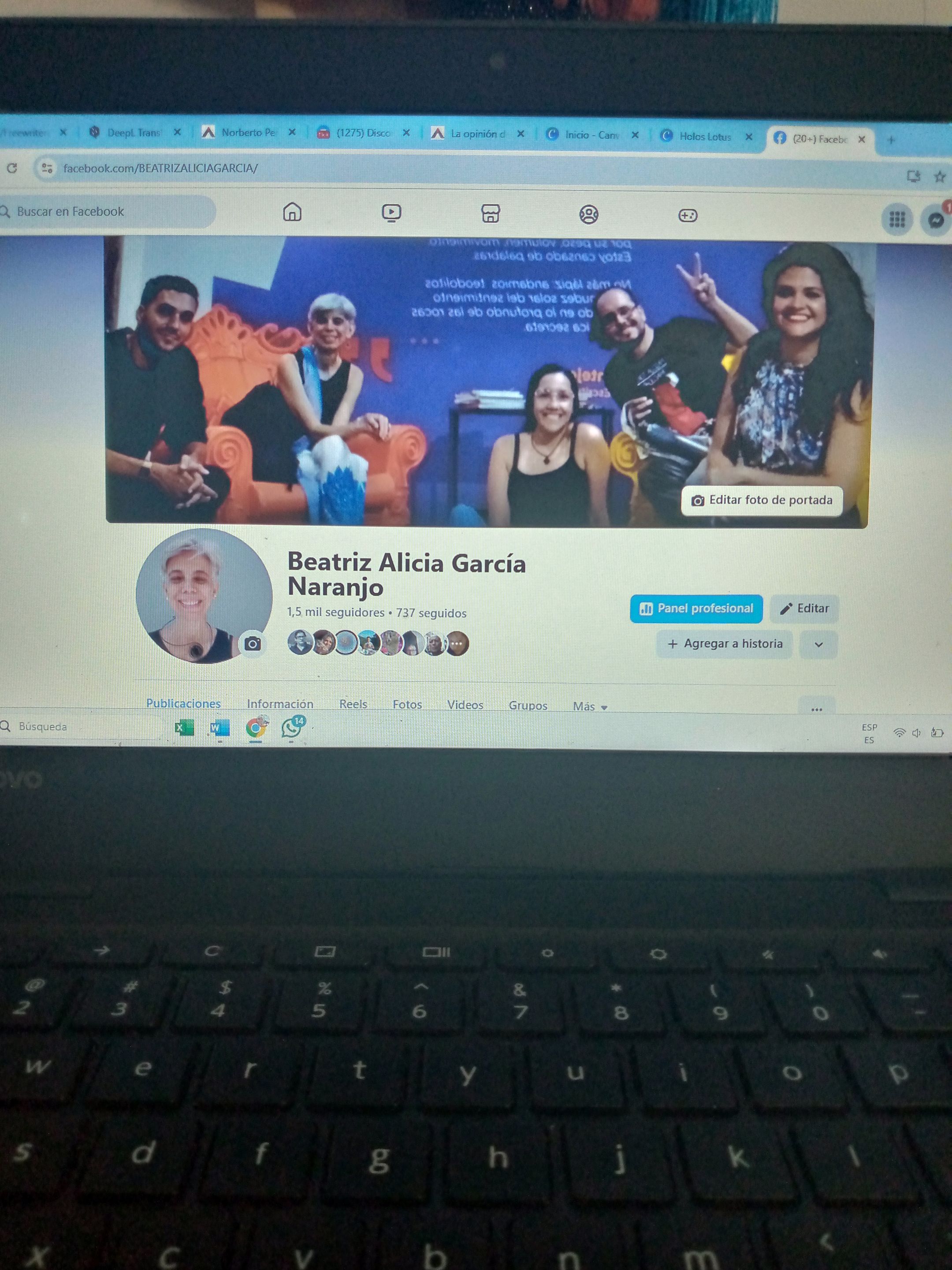
foto de mi perfil de la red social Facebook

Si construimos nuestra identidad, como he dicho, tomando como espejos a quienes nos rodean, tal como plantea el doctor Ríos, hoy nuestro propio valor puede verse claramente afectado por las redes sociales. Aún cuando muchos de nosotros ya éramos adultos cuando se inició el ecosistema de las redes sociales, y por lo tanto nuestra propia identidad estaba ya construida; si queremos sobrevivir en este mundo totalmente tomado por la identidad digital, tenemos que adaptarnos, deconstruirnos y rehacernos como un yo digital. No a todos nos resulta fácil. Y debo admitir que esa otra que llevo dentro, con la que dialogo en la medida de lo posible, tiene resistencia a ese mundo que le resulta extraño, vertiginoso, cambiante. Yo sigo prefiriendo el trato personal, directo, persona a persona. Y eso me crea no pocos conflictos interiores.
En este pueblo de playa donde ahora vivo con mi actual pareja, por quien vine aquí, a la costa sur de España; he tenido que aprender a verme en dos sentidos, en dos espejos, en la convivencia con mi pareja, y en la convivencia con la sociedad que lo rodea. No es nada fácil. Cada persona es un mundo amplísimo de experiencias, de ideas y de sentimientos. Lo que es claro como el agua para ti no es necesariamente tan claro para tu prójimo. Él es un hombre silencioso y a veces me toca adivinar qué está pensando o qué está sintiendo o tener paciencia y esperar que hable. Un espejo mudo. La parte positiva, me ha puesto en contacto con personas de nuestra edad, que en líneas generales prefieren comunicarse personalmente y estoy en un ecosistema en el que me siento cómoda, a pesar de que he tenido que adaptarme como todo el que llega nuevo a un lugar. Nos une a todos el amor por la lectura y los libros y somos personas mayores de 50 años. Tener cosas en común ayuda en eso de vernos unos a otros como espejos.
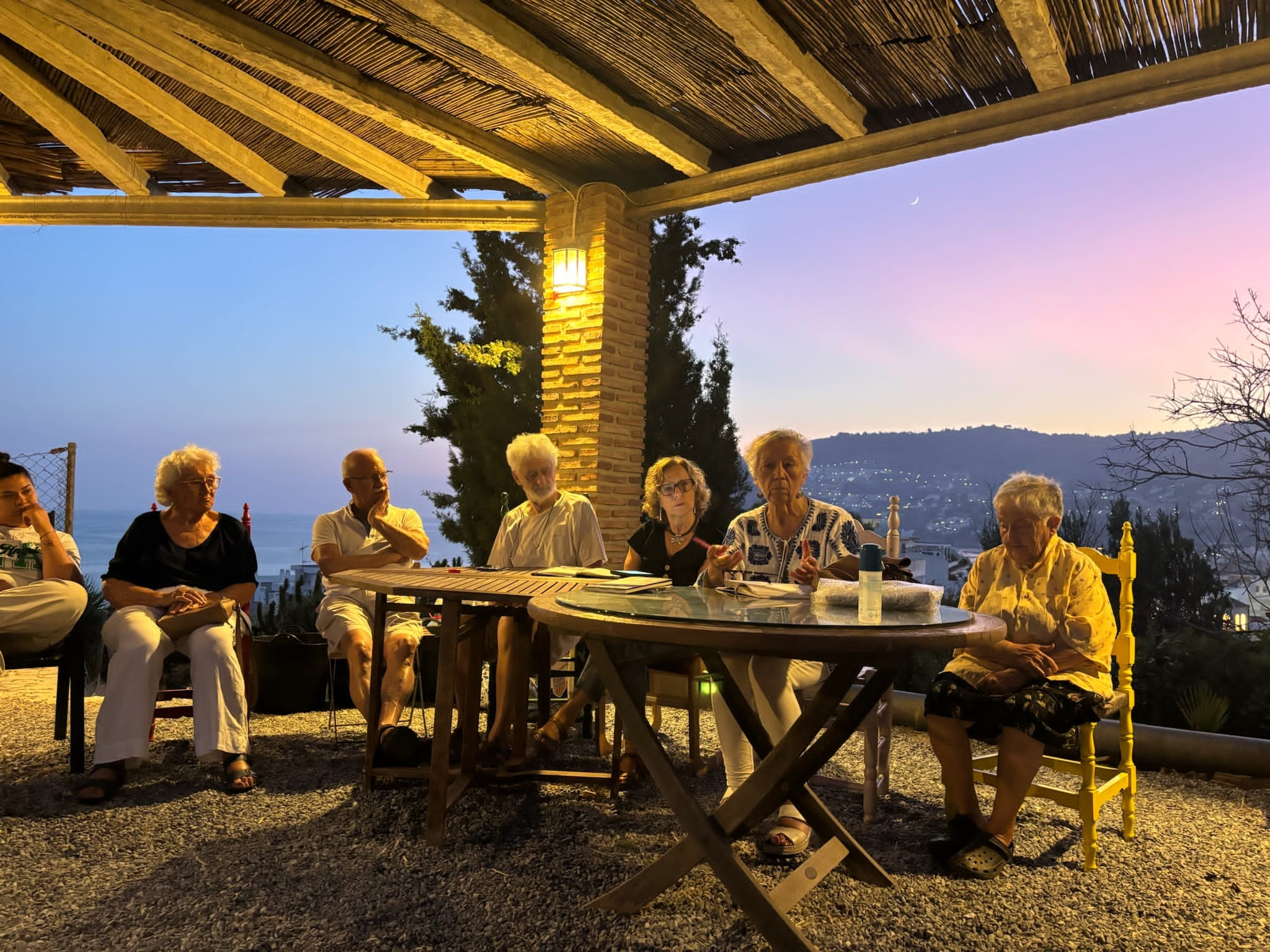
Encuentro del Club de Lectura La Herradura

El diálogo genuino con uno mismo
Nos dice el doctor Ríos:
“El concepto propio proviene de cómo creemos que los demás nos imaginan, nos juzgan o nos perciben.
Pero, tal vez, cuando interaccionamos con nosotros mismos, esta imagen se hace mucho más genuina; de allí que, el hecho de que hablemos solos, de que nos analicemos y de que nos esforcemos por entendernos y comprendernos, es tal vez la parte más importante de la formación de un yo saludable.”
Esto es uno de los planteamientos más interesantes que encontré en el artículo del doctor Ríos. Durante muchos años me sentí aislada, incomprendida, por mi tendencia a la introspección. En una sociedad en la que el éxito parece estar en la imagen exterior y en su proyección banal y narcisista, la reflexión no es algo que se valore colectivamente. La madurez, por lo general, es la que te da las herramientas para alcanzar un equilibrio entre ese ser que puede alimentarse y crecer en su relación con los otros y ese ser que siente la necesidad de pensar el mundo y pensarse y dialogar consigo mismo para transformarse y crecer. Para cerrar esta reflexión quisiera enfatizar en la importancia de lograr un equilibrio entre el yo que se mira a sí mismo y el que se mira en los otros. Los parámetros de la propia valía, de la configuración de nuestra propia identidad no puede estar afuera, pero tampoco extraviarse en el narcisismo egoísta y empobrecedor.
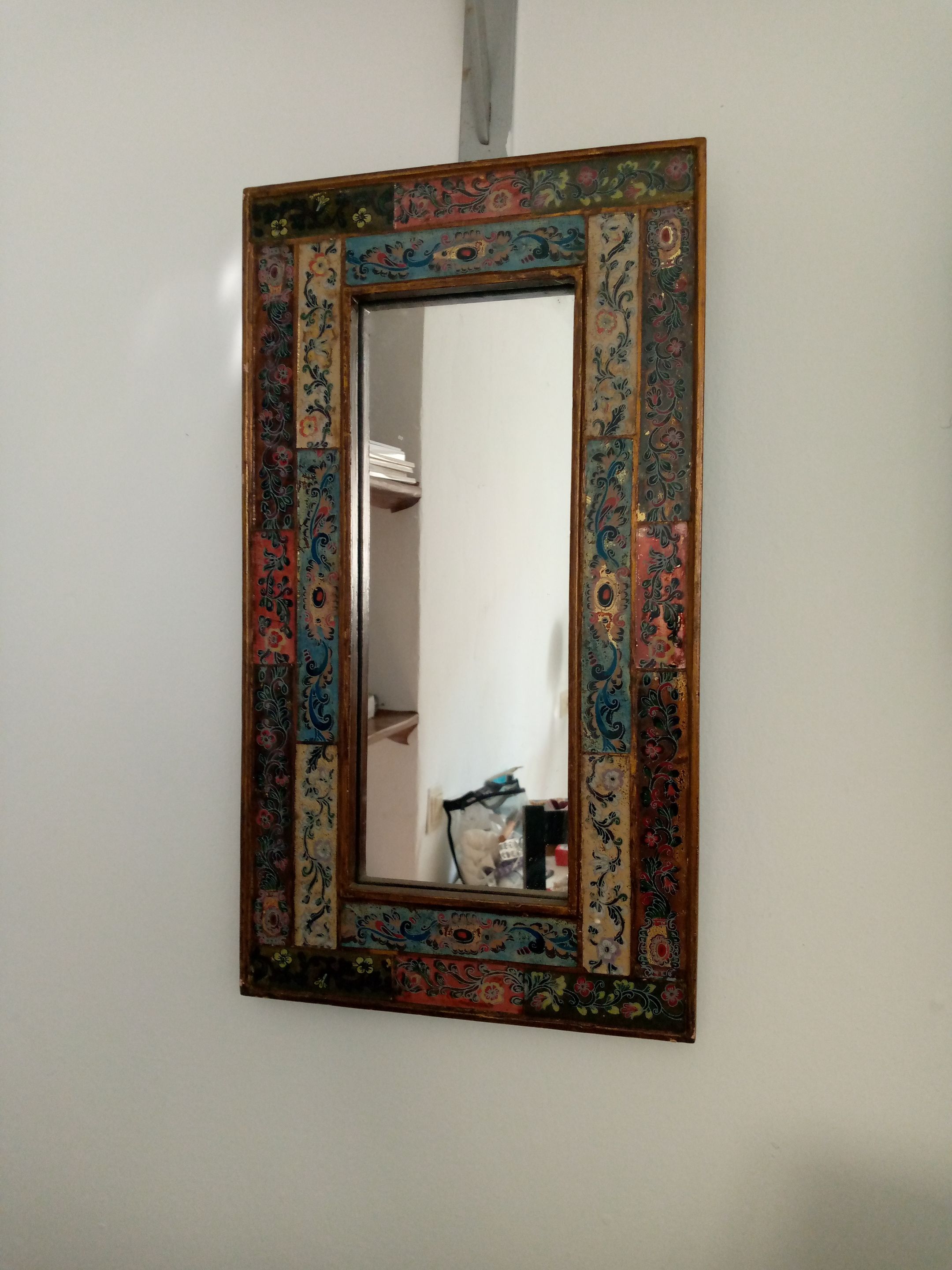
espejo vacío

Traducción al inglés con Deepl.com
📷 Las fotos que ves fueron tomadas con la cámara de mi teléfono móvil.

TELL ME WHO YOU LOOK UP TO AND I'LL TELL YOU WHO YOU ARE

More than two thousand years ago, during the classical period of Greek culture, Aristotle said that man is a “Zoon Politikon,” that is, a social being. Indeed, even if we live in a small village, we communicate and build our identity nourished by our relationships with those around us. First our family, and then others, are a kind of mirror. Because the word identity, that elusive and changing being we call “I,” is constructed, and sometimes deconstructed, insofar as it resembles others, but also insofar as it differs from others.


While searching for an interesting topic to write about, I came across one of those intriguing reflections by Dr. @emiliorios, who revisits a previous reflection in his post, both of which are very interesting and refer to the problem of identity and how those around us influence the way we see ourselves. I will revisit the most recent one, “The opinions of others, my own, and Cooley's Mirror Self Theory” https://peakd.com/hive-131951/@emiliorios/the-opinion-of-others-my-own-and-cooley's-looking-glass-theory-results-of-a-non-initiative-7th-day-esen It's an excellent topic now that I'm in a new country, in a different society, and trying to adapt by looking for common ground and trying to ignore what makes me different, what marks me as a foreigner. I'm Venezuelan, Latin American, and happily, I now live in Spain, a Spanish-speaking country. Living in a country where another language is spoken could complicate things even more.
I will take some quotes from Dr. Ríos and reflect on them:
“We cannot deny that we are living in a culture in which what others think of us, how others see us, and what we think or believe about something is too important.”
Social networks as a mirror

photo of my Facebook profile

If we construct our identity, as I have said, by mirroring those around us, as Dr. Ríos suggests, today our own value can be clearly affected by social media. Even though many of us were already adults when the social media ecosystem began, and therefore our own identity was already established, if we want to survive in this world completely taken over by digital identity, we have to adapt, deconstruct ourselves, and remake ourselves as a digital self. It is not easy for all of us. And I must admit that the other self I carry inside, with whom I dialogue as much as possible, resists this world that is strange, dizzying, and changing. I still prefer personal, direct, person-to-person interaction. And that creates no small amount of inner conflict for me.
In this beach town where I now live with my current partner, the reason I came here to the southern coast of Spain, I have had to learn to see myself in two ways, in two mirrors: in my relationship with my partner and in my relationship with the society around us. It is not easy. Each person is a vast world of experiences, ideas, and feelings. What is crystal clear to you is not necessarily so clear to your neighbor. He is a quiet man, and sometimes I have to guess what he is thinking or feeling, or be patient and wait for him to speak. A silent mirror. On the positive side, it has brought me into contact with people our age, who generally prefer to communicate in person, and I am in an ecosystem where I feel comfortable, even though I have had to adapt like anyone who is new to a place. We are all united by a love of reading and books, and we are all over 50 years old. Having things in common helps us to see each other as mirrors.

Meeting of the La Herradura Reading Club

Doctor Ríos tell us:
“Our self-concept comes from how we believe others imagine, judge, or perceive us.
But perhaps when we interact with ourselves, this image becomes much more genuine; hence, the fact that we talk to ourselves, analyze ourselves, and strive to understand and comprehend ourselves is perhaps the most important part of forming a healthy self.
This is one of the most interesting points I found in Dr. Ríos' article. For many years, I felt isolated and misunderstood because of my tendency toward introspection. In a society where success seems to be based on outward appearances and superficial, narcissistic self-promotion, reflection is not something that is collectively valued. Maturity, in general, is what gives you the tools to achieve a balance between the self that can feed and grow in its relationship with others and the self that feels the need to think about the world and think about itself and dialogue with itself in order to transform and grow. To conclude this reflection, I would like to emphasize the importance of achieving a balance between the self that looks at itself and the self that looks at others. The parameters of our own worth, of the configuration of our own identity, cannot be outside ourselves, but neither can they be lost in selfish and impoverishing narcissism.

empty mirror

Translated with Deepl.com
📷 Photos you see were taken with my cell phone camera.





















